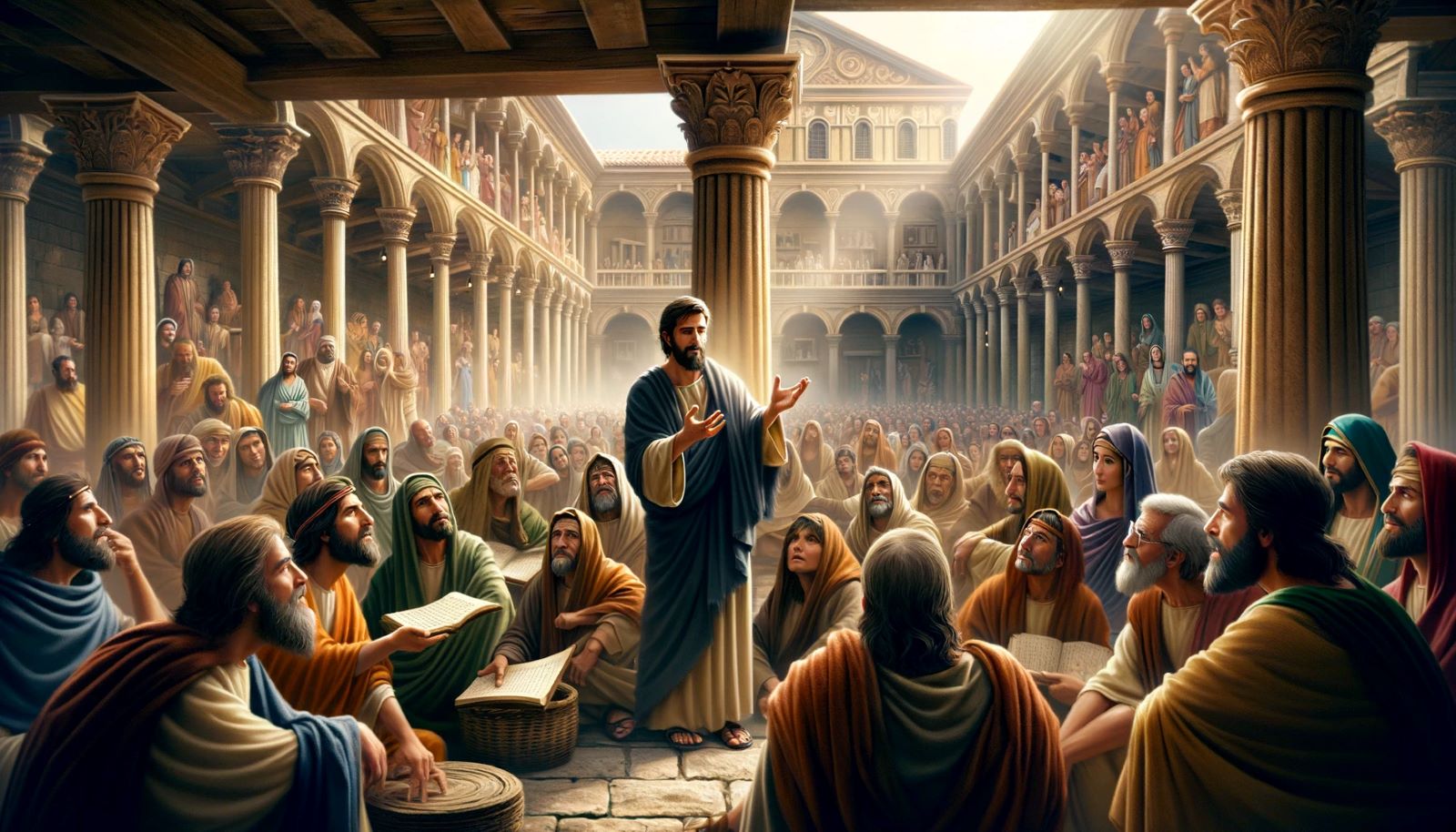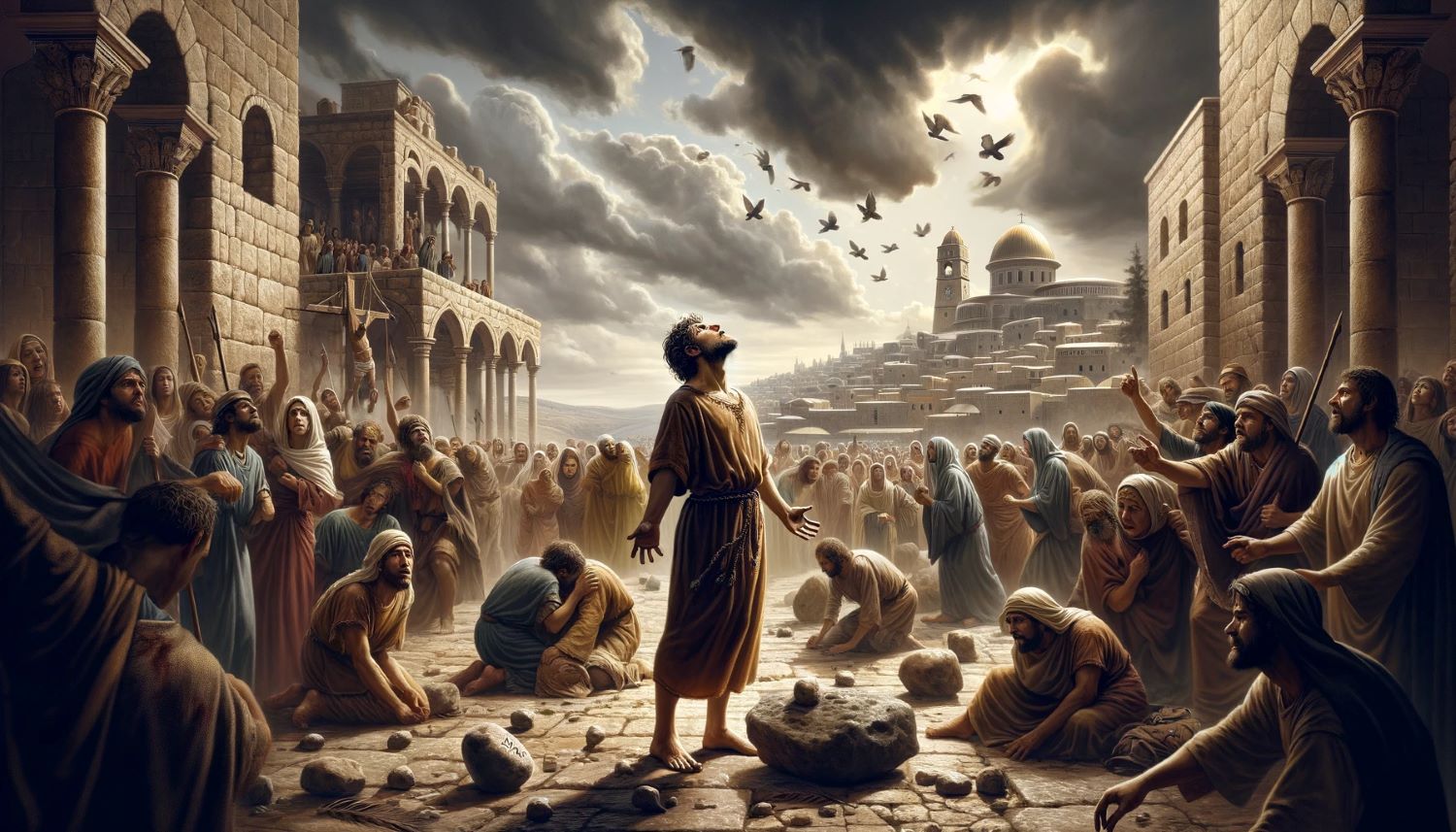Home>Bible Facts>Who Are Jesus 12 Apostles


Bible Facts
Who Are Jesus 12 Apostles
Published: February 22, 2024
Jason DeRose, Managing Editor at Christian.net, uses his expertise in religion and journalism to deepen understanding of faith's societal impacts. His editorial leadership, coupled with a strong academic background, enriches the platform’s diverse content, earning him recognition in both journalism and religious circles.
Discover interesting Bible facts about Jesus' 12 apostles and their significance in Christian history. Learn about their roles and impact on the early church. Explore their stories and contributions.
(Many of the links in this article redirect to a specific reviewed product. Your purchase of these products through affiliate links helps to generate commission for Christian.net, at no extra cost. Learn more)
Table of Contents
Introduction
The 12 apostles of Jesus Christ hold a significant place in Christian history and theology. These individuals were chosen by Jesus to be his closest companions and to spread his teachings to the world. Their unwavering dedication and pivotal roles in the formation of the early Christian church have made them enduring figures in religious discourse.
The apostles were a diverse group, each with their own unique backgrounds, personalities, and contributions to the ministry of Jesus. Their stories are intertwined with the miracles, parables, and profound teachings of Jesus, providing a rich tapestry of faith, loyalty, and human frailty.
As we delve into the lives of these remarkable individuals, we gain insight into the profound impact they had on the spread of Christianity and the enduring legacy they left behind. Each apostle's journey is a testament to the transformative power of faith and the enduring message of love and redemption that Jesus imparted to the world.
Join us on a captivating exploration of the lives and legacies of the 12 apostles, as we uncover the profound significance of their roles in the foundational narrative of Christianity.
Read more: Who Were Jesus Apostles
Peter
Peter, originally known as Simon, was a prominent figure among the 12 apostles and held a special place in the ministry of Jesus. He was a fisherman by trade, working alongside his brother Andrew in the town of Capernaum. When Jesus encountered Peter and Andrew, he called out to them, saying, "Come, follow me, and I will send you out to fish for people" (Matthew 4:19, NIV). This pivotal moment marked the beginning of Peter's transformative journey as a disciple of Jesus.
Peter's impulsive and passionate nature often led him to be at the forefront of significant events in the Gospels. He was the first to declare Jesus as the Messiah, saying, "You are the Messiah, the Son of the living God" (Matthew 16:16, NIV). This profound declaration solidified Peter's recognition of Jesus' divine identity and marked a pivotal moment in their relationship.
Despite his unwavering devotion, Peter also experienced moments of doubt and fear. One of the most well-known accounts is Peter's denial of Jesus, which occurred three times as Jesus had predicted. This humbling experience serves as a poignant reminder of the complexities of human nature and the challenges faced by even the most steadfast followers.
Peter's leadership and unwavering faith were evident in the early Christian church. Following Jesus' ascension, Peter played a crucial role in spreading the message of the Gospel, particularly to the Jewish community. His boldness and conviction were on display during the Day of Pentecost, where he delivered a powerful sermon that led to the conversion of thousands.
The enduring legacy of Peter extends beyond his earthly ministry. He is often regarded as the rock upon which the Christian church was built, symbolizing strength and steadfastness. His letters, known as 1 Peter and 2 Peter, offer profound insights into the themes of suffering, perseverance, and hope, providing enduring guidance for believers.
Peter's journey exemplifies the transformative power of faith and the complexities of human devotion. His unwavering commitment to Jesus, coupled with moments of vulnerability and growth, resonates with individuals across generations. The life of Peter serves as a compelling narrative of redemption, resilience, and the enduring impact of encountering the divine.
Through the lens of Peter's experiences, we gain a deeper understanding of the profound influence of the apostles and their integral role in shaping the early Christian movement. His story continues to inspire and resonate with believers, offering timeless lessons of faith, humility, and the enduring grace of God.
Andrew
Andrew, the brother of Peter, was a pivotal figure among the 12 apostles chosen by Jesus. Like his brother, Andrew was a fisherman by trade, laboring in the coastal town of Capernaum. It was in this familiar setting that Andrew's life took a transformative turn when he encountered Jesus, the itinerant preacher from Nazareth.
Andrew's introduction to Jesus is a poignant moment captured in the Gospels. Upon meeting Jesus, Andrew recognized his profound spiritual significance and wasted no time in sharing this life-changing encounter with his brother, Peter. This act of immediate evangelism underscores Andrew's deep sense of conviction and his eagerness to impart the transformative message of Jesus to those closest to him.
Throughout the Gospels, Andrew is often portrayed as a humble and faithful disciple, dedicated to supporting Jesus in his ministry. His steadfast commitment to Jesus is exemplified in various accounts, including the miraculous feeding of the five thousand, where Andrew played a role in bringing the young boy with five barley loaves and two fish to Jesus, demonstrating his willingness to contribute to the needs of others.
Andrew's humility and selflessness are further highlighted in his interactions with Jesus. Despite not occupying the spotlight like some of his fellow apostles, Andrew's quiet dedication and unwavering loyalty left an indelible mark on the ministry of Jesus. His willingness to serve and support Jesus, coupled with his genuine enthusiasm for sharing the message of the Gospel, exemplify the virtues of humility and devotion.
Following Jesus' ascension, Andrew continued to play a significant role in the early spread of Christianity. Tradition holds that Andrew traveled extensively, proclaiming the teachings of Jesus in various regions, including modern-day Greece, Ukraine, and Russia. His missionary endeavors and unwavering commitment to spreading the message of Christ reflect his enduring dedication to the cause he embraced alongside Jesus.
Andrew's legacy extends beyond his earthly ministry, as he remains a revered figure in Christian tradition. He is celebrated as the patron saint of Scotland, Romania, and Russia, among other regions, underscoring the enduring impact of his missionary zeal and the profound influence of his teachings.
The life of Andrew serves as a compelling testament to the transformative power of faith and the profound impact of quiet dedication and steadfast loyalty. His unwavering commitment to Jesus, coupled with his humility and evangelistic fervor, continues to inspire believers across the globe, offering timeless lessons of devotion, service, and the enduring legacy of the apostles.
James, son of Zebedee
James, the son of Zebedee, was one of the twelve apostles chosen by Jesus to accompany him in his ministry. Alongside his brother John, James was part of the inner circle of disciples who shared intimate moments with Jesus, such as the transfiguration and the agony in the Garden of Gethsemane. His prominent role within this select group underscores the depth of his relationship with Jesus and the significance of his contributions to the early Christian movement.
James, known for his fervent dedication and zealous spirit, was not without his moments of transformation and growth. His initial encounter with Jesus, where he and his brother were mending their fishing nets, marked the beginning of a profound journey of discipleship. In response to Jesus' call, James and John left behind their livelihood and familial ties to follow the enigmatic teacher from Nazareth, embodying a radical commitment to the message and mission of Jesus.
Throughout the Gospels, James is depicted as a passionate and assertive disciple, often displaying a fiery temperament that earned him and his brother the nickname "Sons of Thunder." This fervor was evident in their bold request to Jesus to sit at his right and left hand in his kingdom, reflecting their deep longing for honor and recognition. However, Jesus' gentle rebuke and subsequent teachings on servant leadership served as transformative lessons for James, shaping his understanding of humility and selfless devotion.
James' unwavering commitment to Jesus was further exemplified in his willingness to endure persecution and suffering for the sake of the Gospel. His martyrdom, recorded in the book of Acts, stands as a testament to his unwavering faith and steadfast allegiance to the message he had embraced alongside Jesus. James' martyrdom serves as a poignant reminder of the sacrifices made by the early apostles and the enduring legacy of their unwavering commitment to the cause of Christ.
Beyond his earthly ministry, James' enduring influence is reflected in his recognition as the patron saint of Spain, where his relics are believed to be enshrined in the Cathedral of Santiago de Compostela. The pilgrimage to his shrine, known as the Camino de Santiago, continues to draw thousands of pilgrims each year, underscoring the enduring impact of James' legacy and the profound reverence with which he is held in Christian tradition.
The life of James, son of Zebedee, serves as a compelling narrative of transformation, fervent devotion, and unwavering commitment to the teachings of Jesus. His journey from a zealous disciple to a martyr for the faith encapsulates the profound impact of encountering the divine and the enduring legacy of the apostles in shaping the narrative of Christianity.
John
John, often referred to as the beloved disciple, occupies a unique and revered position among the 12 apostles chosen by Jesus. His profound relationship with Jesus, coupled with his significant contributions to the early Christian movement, solidifies his enduring legacy as a pivotal figure in Christian history.
From the shores of the Sea of Galilee, John embarked on a transformative journey as a disciple of Jesus. His initial encounter with Jesus, alongside his brother James, marked the beginning of a profound and enduring relationship. John's deep spiritual connection with Jesus is evident throughout the Gospels, particularly in his portrayal as the disciple whom Jesus loved, underscoring the intimacy and depth of their bond.
John's role as the beloved disciple afforded him unique insights into the teachings and miracles of Jesus. His presence at pivotal moments, such as the Last Supper and the crucifixion, highlights his unwavering loyalty and steadfast commitment to Jesus, even in the face of adversity. It was at the foot of the cross that Jesus entrusted the care of his mother, Mary, to John, symbolizing a profound level of trust and affection.
The Gospel of John, attributed to the beloved disciple, stands as a testament to his profound understanding of Jesus' divinity and the transformative power of his teachings. Through vivid imagery and profound theological reflections, the Gospel of John offers a unique perspective on the life and ministry of Jesus, emphasizing themes of love, redemption, and the eternal nature of Christ's message.
Following Jesus' ascension, John continued to play a pivotal role in the early spread of Christianity. His leadership and influence extended to the early Christian community, where he provided guidance and pastoral care to believers. John's enduring commitment to preserving the teachings of Jesus is evident in his letters, known as 1 John, 2 John, and 3 John, which offer profound insights into the themes of love, truth, and fellowship.
The legacy of John extends beyond his earthly ministry, as he is traditionally recognized as the author of the Book of Revelation. This apocalyptic work, filled with vivid symbolism and prophetic visions, underscores John's unwavering faith and his commitment to conveying the eternal truths of the Christian faith.
The life of John, the beloved disciple, serves as a profound testament to the transformative power of encountering Jesus and the enduring impact of unwavering devotion. His intimate connection with Jesus, coupled with his profound theological insights, continues to inspire believers across the globe, offering timeless lessons of love, faith, and the enduring legacy of the apostles.
Read more: Who Were All Of Jesus Apostles
Philip
Philip, a significant figure among the 12 apostles chosen by Jesus, played a pivotal role in the ministry and spread of the teachings of Jesus. His journey as a disciple began with a simple yet profound invitation from Jesus, who said to him, "Follow me" (John 1:43, NIV). This transformative encounter marked the beginning of Philip's dedicated commitment to the message and mission of Jesus.
Throughout the Gospels, Philip is portrayed as a thoughtful and inquisitive disciple, often seeking deeper understanding and clarity. One notable account is his encounter with Nathanael, where Philip enthusiastically shared his life-changing experience with Jesus, prompting Nathanael's initial skepticism. Philip's earnest invitation, "Come and see," reflects his genuine desire to share the transformative presence of Jesus with others, embodying a spirit of evangelism and openness.
Philip's unwavering dedication to Jesus was further exemplified in his role during the miraculous feeding of the five thousand. When faced with the daunting task of providing food for the multitude, Philip's practical assessment of the situation revealed his human limitations. However, this moment served as a profound opportunity for Jesus to demonstrate his divine power, turning scarcity into abundance and revealing the limitless potential of faith.
Following Jesus' ascension, Philip continued to play a significant role in the early spread of Christianity. His missionary endeavors and unwavering commitment to sharing the message of Jesus led him to various regions, where he fearlessly proclaimed the transformative power of the Gospel. Philip's evangelistic zeal and unwavering dedication to the cause he embraced alongside Jesus underscore the enduring impact of his ministry.
The enduring legacy of Philip extends beyond his earthly ministry, as he remains a revered figure in Christian tradition. His unwavering commitment to sharing the message of Jesus and his willingness to engage in thought-provoking dialogue serve as timeless examples for believers seeking to embody the spirit of evangelism and openness.
The life of Philip serves as a compelling narrative of transformative encounters, unwavering commitment, and the enduring impact of sharing the message of Jesus. His journey as a disciple exemplifies the profound influence of encountering the divine and the enduring legacy of the apostles in shaping the narrative of Christianity.
Bartholomew
Bartholomew, also known as Nathanael, was a significant yet enigmatic figure among the 12 apostles chosen by Jesus. His presence in the Gospels offers a glimpse into the transformative power of encountering Jesus and the profound impact of unwavering faith and discipleship.
The initial encounter between Bartholomew and Jesus is captured in the Gospel of John, where Philip, another disciple, excitedly shared his life-changing experience with Jesus. Upon hearing about Jesus of Nazareth, Bartholomew expressed skepticism, questioning the possibility of anything good coming from Nazareth. This candid exchange reflects Bartholomew's discerning nature and his willingness to engage in thoughtful dialogue. However, his encounter with Jesus proved to be transformative, as Jesus, upon seeing Bartholomew, declared him to be a true Israelite in whom there was no deceit. This profound revelation marked the beginning of Bartholomew's journey as a devoted disciple of Jesus.
Bartholomew's unwavering commitment to Jesus is further exemplified in his presence among the 12 apostles, where he played a pivotal role in the ministry and spread of the teachings of Jesus. His steadfast dedication and willingness to engage in sincere dialogue underscore his profound understanding of the transformative message of Jesus and his commitment to sharing this message with others.
Following Jesus' ascension, Bartholomew continued to play a significant role in the early spread of Christianity. Tradition holds that Bartholomew embarked on missionary endeavors, fearlessly proclaiming the transformative power of the Gospel in various regions. His unwavering commitment to sharing the message of Jesus and his willingness to engage in thought-provoking dialogue serve as timeless examples for believers seeking to embody the spirit of evangelism and openness.
The enduring legacy of Bartholomew extends beyond his earthly ministry, as he remains a revered figure in Christian tradition. His discerning nature, unwavering commitment to the teachings of Jesus, and his willingness to engage in sincere dialogue continue to inspire believers across the globe, offering timeless lessons of faith, discernment, and the enduring legacy of the apostles.
Bartholomew's journey as a disciple exemplifies the profound influence of encountering the divine and the enduring impact of unwavering commitment to the transformative message of Jesus. His life serves as a compelling narrative of transformative encounters, unwavering commitment, and the enduring legacy of the apostles in shaping the narrative of Christianity.
Thomas
Thomas, often referred to as "Doubting Thomas," occupies a significant place among the 12 apostles chosen by Jesus. His journey as a disciple is characterized by moments of skepticism, profound transformation, and unwavering faith, offering timeless lessons of doubt and belief.
One of the most well-known accounts involving Thomas is his initial skepticism regarding Jesus' resurrection. Following the crucifixion, when the other disciples shared the news of encountering the risen Christ, Thomas expressed disbelief, stating that unless he saw the nail marks in Jesus' hands and put his finger where the nails were, and put his hand into Jesus' side, he would not believe. This candid expression of doubt earned him the moniker "Doubting Thomas" and serves as a poignant reminder of the complexities of faith and human nature.
However, Thomas' journey of doubt did not culminate in skepticism. His transformative encounter with the resurrected Jesus stands as a testament to the profound impact of encountering the divine. When Jesus appeared to the disciples, including Thomas, he invited Thomas to touch his wounds, prompting Thomas to declare, "My Lord and my God!" This profound declaration encapsulates the transformative journey of doubt to belief, underscoring the profound impact of encountering the risen Christ.
Thomas' unwavering faith and profound declaration serve as enduring symbols of the transformative power of encountering the divine. His journey from doubt to belief offers profound insights into the complexities of faith and the enduring grace of God. Thomas' willingness to confront his doubts and embrace the truth of Jesus' resurrection embodies the profound journey of doubt to unwavering conviction, offering timeless lessons for believers across generations.
Following Jesus' ascension, Thomas continued to play a significant role in the early spread of Christianity. His unwavering commitment to the message of the Gospel and his transformative encounter with the risen Christ served as a powerful testimony to the enduring impact of faith and belief. Thomas' journey as a disciple exemplifies the profound influence of encountering the divine and the enduring legacy of the apostles in shaping the narrative of Christianity.
Matthew
Matthew, also known as Levi, was a pivotal figure among the 12 apostles chosen by Jesus. His journey as a disciple is characterized by a transformative encounter with Jesus and a profound commitment to spreading the message of the Gospel.
As a tax collector, Matthew's societal status positioned him on the periphery of acceptance, often regarded with disdain and suspicion by his fellow Jews. However, his encounter with Jesus marked a profound turning point in his life. When Jesus extended the invitation, "Follow me," Matthew responded with unwavering obedience, leaving behind his occupation and embracing a new calling as a disciple of Jesus. This pivotal moment underscores the transformative power of encountering the divine and the radical nature of Jesus' inclusive ministry.
Matthew's commitment to Jesus extended beyond his personal transformation. His role as an apostle and evangelist solidified his dedication to spreading the message of the Gospel. Following Jesus' ascension, Matthew played a significant role in the early spread of Christianity, particularly through his authorship of the Gospel of Matthew. This profound work stands as a testament to Matthew's unwavering commitment to preserving the teachings and life of Jesus, offering a comprehensive account of Jesus' ministry, teachings, and divine identity.
The Gospel of Matthew, with its emphasis on Jesus as the fulfillment of Old Testament prophecies and the establishment of the new covenant, reflects Matthew's profound understanding of the transformative message of Jesus. Through vivid narratives and profound theological reflections, the Gospel of Matthew offers timeless insights into the redemptive work of Christ and the enduring significance of his teachings.
Matthew's enduring legacy extends beyond his earthly ministry, as his Gospel continues to inspire and guide believers across the globe. His unwavering commitment to preserving the message of Jesus and his transformative encounter with the divine serve as enduring symbols of the profound impact of encountering the risen Christ.
The life of Matthew serves as a compelling narrative of transformation, unwavering commitment, and the enduring legacy of the apostles in shaping the narrative of Christianity. His journey from a tax collector to a devoted disciple and evangelist offers timeless lessons of redemption, inclusivity, and the enduring grace of God.
Read more: Who Was The Beloved Apostle Of Jesus Christ
James, son of Alphaeus
James, son of Alphaeus, is a figure shrouded in mystery and humility among the 12 apostles chosen by Jesus. His presence in the Gospels offers a glimpse into the transformative power of quiet dedication and steadfast faith, underscoring the profound impact of unwavering commitment to the message and mission of Jesus.
While James, son of Alphaeus, may not occupy the spotlight like some of his fellow apostles, his unwavering commitment to Jesus is evident in his presence among the chosen twelve. His quiet dedication and steadfast loyalty to the teachings of Jesus exemplify the virtues of humility and unwavering faith, serving as a timeless example for believers seeking to embody the spirit of devotion and service.
The life of James, son of Alphaeus, serves as a compelling testament to the transformative power of faith and the enduring impact of quiet dedication. His journey as a disciple exemplifies the profound influence of encountering the divine and the enduring legacy of the apostles in shaping the narrative of Christianity.
Thaddaeus
Thaddaeus, also known as Judas, son of James, occupies a significant yet understated role among the 12 apostles chosen by Jesus. His presence in the Gospels offers a compelling narrative of quiet dedication, steadfast faith, and unwavering commitment to the transformative message of Jesus.
While Thaddaeus may not be as prominently featured as some of his fellow apostles, his steadfast loyalty and unwavering commitment to Jesus are evident in his presence among the chosen twelve. His quiet dedication and humble service exemplify the virtues of humility and unwavering faith, serving as a timeless example for believers seeking to embody the spirit of devotion and service.
Thaddaeus' journey as a disciple is characterized by his steadfast commitment to the teachings and mission of Jesus. Despite the limited details provided in the Gospels, his presence among the apostles underscores the profound impact of quiet dedication and unwavering faith in the narrative of Christianity. His willingness to embrace the transformative message of Jesus, coupled with his steadfast loyalty, serves as a poignant reminder of the enduring impact of encountering the divine.
Following Jesus' ascension, Thaddaeus continued to play a significant role in the early spread of Christianity. His unwavering commitment to the message of the Gospel and his quiet dedication to the cause he embraced alongside Jesus underscore the enduring impact of his ministry. Thaddaeus' journey as a disciple exemplifies the profound influence of encountering the divine and the enduring legacy of the apostles in shaping the narrative of Christianity.
The life of Thaddaeus serves as a compelling testament to the transformative power of faith and the enduring impact of quiet dedication. His journey as a disciple offers timeless lessons of unwavering commitment, humility, and the enduring grace of God, inspiring believers to embrace the spirit of quiet devotion and steadfast faith.
Simon the Zealot
Simon the Zealot, also known as Simon the Cananaean, occupies a significant yet enigmatic place among the 12 apostles chosen by Jesus. His presence in the Gospels offers a compelling narrative of unwavering dedication, fervent zeal, and a transformative commitment to the message and mission of Jesus.
The designation "Zealot" attributed to Simon carries profound historical and ideological significance. The Zealots were a Jewish sect known for their ardent devotion to the Mosaic law and their fervent opposition to Roman occupation. Simon's association with this movement underscores his passionate commitment to Jewish independence and religious fervor, offering insights into the complexities of the socio-political landscape during the time of Jesus.
Simon's journey as a disciple is characterized by his unwavering commitment to the teachings and mission of Jesus. His fervent zeal, once directed towards political and nationalistic aspirations, found a transformative outlet in embracing the transformative message of Jesus. This pivotal shift underscores the profound impact of encountering the divine and the radical transformation experienced by individuals in the presence of Jesus.
While the Gospels provide limited details about Simon's specific contributions, his presence among the chosen twelve underscores the profound impact of unwavering dedication and fervent commitment in the narrative of Christianity. His willingness to embrace the transformative message of Jesus, coupled with his fervent zeal, serves as a poignant reminder of the enduring impact of encountering the divine.
Following Jesus' ascension, Simon continued to play a significant role in the early spread of Christianity. His unwavering commitment to the message of the Gospel and his fervent dedication to the cause he embraced alongside Jesus underscore the enduring impact of his ministry. Simon the Zealot's journey as a disciple exemplifies the profound influence of encountering the divine and the enduring legacy of the apostles in shaping the narrative of Christianity.
The life of Simon the Zealot serves as a compelling testament to the transformative power of faith and the enduring impact of fervent dedication. His journey as a disciple offers timeless lessons of unwavering commitment, fervent zeal, and the enduring grace of God, inspiring believers to embrace the spirit of unwavering devotion and passionate faith.
Judas Iscariot
Judas Iscariot, a figure synonymous with betrayal and tragedy, occupies a complex and somber place among the 12 apostles chosen by Jesus. His presence in the Gospels offers a haunting narrative of disillusionment, moral failure, and the profound consequences of his actions.
Judas' journey as a disciple is marked by moments of internal conflict and moral ambiguity. Despite being chosen by Jesus to be one of the twelve, Judas' motivations and inner turmoil remain shrouded in mystery. The pivotal moment of betrayal, where Judas identified Jesus with a kiss, stands as a haunting testament to the complexities of human frailty and the devastating impact of betrayal.
The motivations behind Judas' betrayal have been the subject of theological and historical scrutiny. Some interpretations suggest financial greed or political disillusionment as potential factors, while others emphasize the enigmatic nature of Judas' actions. Regardless of the underlying motivations, Judas' betrayal serves as a poignant reminder of the profound consequences of moral failure and the enduring impact of his actions on the narrative of Christianity.
Following his act of betrayal, Judas experienced overwhelming remorse, leading to a tragic end. The Gospel accounts depict his deep sense of regret, culminating in his tragic death. The haunting narrative of Judas' demise serves as a sobering reminder of the complexities of human nature and the devastating consequences of moral failure.
The enduring legacy of Judas extends beyond his act of betrayal, as his tragic narrative serves as a cautionary tale of the profound impact of moral choices. His story prompts reflection on the complexities of human frailty and the enduring consequences of betrayal, offering timeless lessons of moral accountability and the devastating impact of betrayal.
Judas Iscariot's journey as a disciple stands as a haunting narrative of moral failure, remorse, and the enduring consequences of betrayal. His tragic narrative serves as a poignant reminder of the complexities of human nature and the profound impact of moral choices, prompting reflection on the enduring legacy of his actions in shaping the narrative of Christianity.
Read more: Who Are The Apostles Of Today
Conclusion
The lives and legacies of the 12 apostles of Jesus Christ offer a profound tapestry of faith, devotion, and human frailty. From the impulsive yet steadfast Peter to the enigmatic and tragic figure of Judas Iscariot, each apostle's journey embodies the transformative power of encountering the divine and the enduring impact of unwavering commitment to the message and mission of Jesus.
These remarkable individuals, chosen by Jesus to be his closest companions, played pivotal roles in the formation of the early Christian church. Their diverse backgrounds, personalities, and contributions to the ministry of Jesus underscore the rich tapestry of faith and human experience that shaped the foundational narrative of Christianity.
The apostles' journeys are marked by moments of doubt, fervent zeal, quiet dedication, and tragic betrayal, offering timeless lessons for believers across generations. Their unwavering commitment to spreading the message of the Gospel, coupled with their human vulnerabilities, serves as a poignant reminder of the complexities of faith and the enduring grace of God.
Through their transformative encounters with Jesus, the apostles exemplify the profound impact of encountering the divine and the enduring legacy of their unwavering devotion. Their journeys from doubt to belief, from fervent zeal to quiet dedication, and from moral failure to unwavering commitment offer timeless lessons of redemption, resilience, and the enduring grace of God.
The enduring legacy of the 12 apostles extends beyond their earthly ministry, as their stories continue to inspire and resonate with believers across the globe. Their unwavering commitment to the transformative message of Jesus, coupled with their human vulnerabilities, serves as enduring symbols of the profound impact of encountering the risen Christ.
As we reflect on the lives and legacies of the 12 apostles, we are reminded of the transformative power of faith, the complexities of human nature, and the enduring grace of God. Their journeys offer timeless lessons of devotion, resilience, and the enduring legacy of encountering the divine, shaping the narrative of Christianity and inspiring believers to embrace the transformative message of Jesus.












